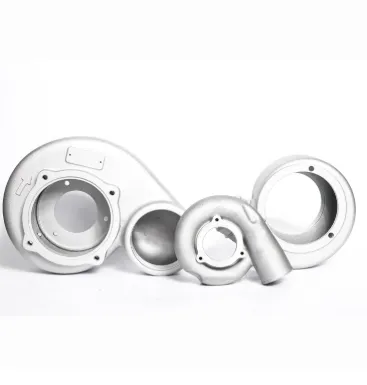Handy, Mobiltelefon:+86-311-808-126-83
Email:info@ydcastings.com
Discover Superior Performance with Advanced Turbo Components
In the highly specialized world of turbo machinery, every component plays a critical role in ensuring optimal efficiency and durability. From the exhaust housing turbo to the stainless steel pump impeller, each part contributes to the seamless operation of turbochargers and pumps in various industrial applications. Understanding the function and advantages of these components can help operators, engineers, and maintenance teams make informed decisions that improve system reliability and performance. As technology evolves, innovations in materials and design continue to push the limits of what turbo equipment can achieve.

The Importance of Exhaust Housing Turbo in Turbocharger Efficiency
Der exhaust housing turbo serves as a fundamental component that directs hot exhaust gases through the turbine wheel, converting energy into mechanical power to spin the compressor. Its design must withstand extreme temperatures and pressure fluctuations while maintaining structural integrity. Precision engineering ensures that the exhaust housing not only optimizes flow dynamics but also reduces energy losses, resulting in improved turbocharger responsiveness. Innovations in material selection and casting processes have enhanced the durability of exhaust housings, enabling longer service life and reduced maintenance intervals in demanding environments such as automotive engines and heavy machinery.
How an Aluminium Impeller Enhances Turbo and Pump Performance
Within turbochargers and pumps, the Aluminium-Laufrad is essential for moving fluids or gases efficiently. Lightweight yet strong, aluminium impellers offer excellent resistance to corrosion and fatigue, which translates into better overall performance and longevity. The aerodynamic profile of these impellers is carefully engineered to maximize flow rates and minimize turbulence. Their reduced mass contributes to quicker acceleration and deceleration of rotating parts, boosting the system’s responsiveness. Moreover, aluminium’s thermal conductivity helps manage heat buildup, ensuring stable operation under continuous load, especially in high-speed turbo applications.
Understanding the Role of Volute Casing and Vortex Casing in Fluid Dynamics
The complex design of the volute casing and vortex casing is crucial for converting kinetic energy from the impeller into pressure energy in centrifugal pumps and turbo machinery. The volute casing gradually expands to slow down the fluid velocity and increase pressure, enhancing pump efficiency. In contrast, vortex casings create a swirling motion that improves fluid handling characteristics, reducing cavitation and wear. Both casings must be precisely manufactured to maintain optimal flow paths and withstand mechanical stresses. Advances in computational fluid dynamics (CFD) have allowed engineers to refine volute and vortex casing designs, optimizing performance across various operating conditions and applications.
Durability and Precision of the Stainless Steel Pump Impeller
Der stainless steel pump impeller is a cornerstone of pump reliability and effectiveness. Known for its corrosion resistance and mechanical strength, stainless steel is an ideal material for impellers operating in harsh or abrasive environments. These impellers deliver consistent hydraulic performance while resisting wear and damage that could lead to costly downtime. Additionally, the surface finish and dimensional accuracy of stainless steel impellers contribute to smoother fluid flow and reduced vibration, extending the lifespan of both the impeller and the pump housing. Precision casting and machining techniques ensure that each impeller meets stringent quality standards for critical industrial applications.
Enhancing Stability and Longevity with a Turbo Bearing Housing
A well-designed turbo bearing housing is vital for supporting the high-speed rotating assembly within a turbocharger. It provides the structural framework to house bearings that manage radial and axial loads, ensuring smooth operation and minimizing mechanical friction. The bearing housing also facilitates proper lubrication and cooling of the bearings, preventing overheating and premature failure. Materials and design improvements have resulted in turbo bearing housings that can withstand extreme centrifugal forces and thermal cycling. These advancements help maintain turbocharger balance and reduce vibration, ultimately enhancing the reliability and efficiency of the entire turbo system.
Why Does the Exhaust Housing Turbo Require Specialized Materials?
Der exhaust housing turbo must endure intense thermal stress due to exposure to hot exhaust gases. Specialized alloys and heat-resistant coatings are used to prevent deformation and cracking, preserving performance over long operating hours. This ensures the turbocharger operates at peak efficiency while minimizing the risk of failure in harsh environments.
What Advantages Do Aluminium Impellers Offer Over Other Materials?
Compared to heavier metals, aluminium impellers provide significant weight savings, which translates into faster rotational response and lower inertia. Their corrosion resistance reduces maintenance needs, and their excellent thermal properties help dissipate heat effectively, improving overall system reliability.
Turbo Components FAQs
Q: What key benefits does a high-quality exhaust housing turbo provide?
A: It improves turbine efficiency by optimizing exhaust gas flow, resists thermal fatigue, and extends the service life of the turbocharger.
Q: Can aluminium impellers be used in all types of turbochargers and pumps?
A: While widely used for their lightweight and corrosion resistance, selection depends on operating conditions such as temperature and fluid type.
Q: How do volute casing and vortex casing designs impact pump efficiency?
A: They influence fluid flow patterns and pressure conversion, directly affecting the pump’s hydraulic performance and energy consumption.
Q: Why choose a stainless steel pump impeller over other impeller materials?
A: Stainless steel offers superior corrosion resistance, strength, and wear resistance, making it ideal for demanding industrial environments.
Q: What role does a turbo bearing housing play in turbocharger longevity?
A: It ensures stable bearing support, effective lubrication, and heat dissipation, all of which are critical for reliable high-speed turbo operation.
-
Materials Used in Manufacturing Cap End Pipe FittingsNachrichtNov.24,2025
-
Material Properties of CF8M CastingNachrichtNov.24,2025
-
How to Inspect Pump Cap Ends for DamageNachrichtNov.21,2025
-
Backward Curved Impeller – Efficient Airflow Solutions for Industry | YD CastingsNachrichtNov.21,2025
-
Automobile Water Pump - Efficient, Quiet, Durable & ElectricNachrichtNov.21,2025
-
Impeller for Pumps – High-Efficiency, Durable, OEM-ReadyNachrichtNov.21,2025











